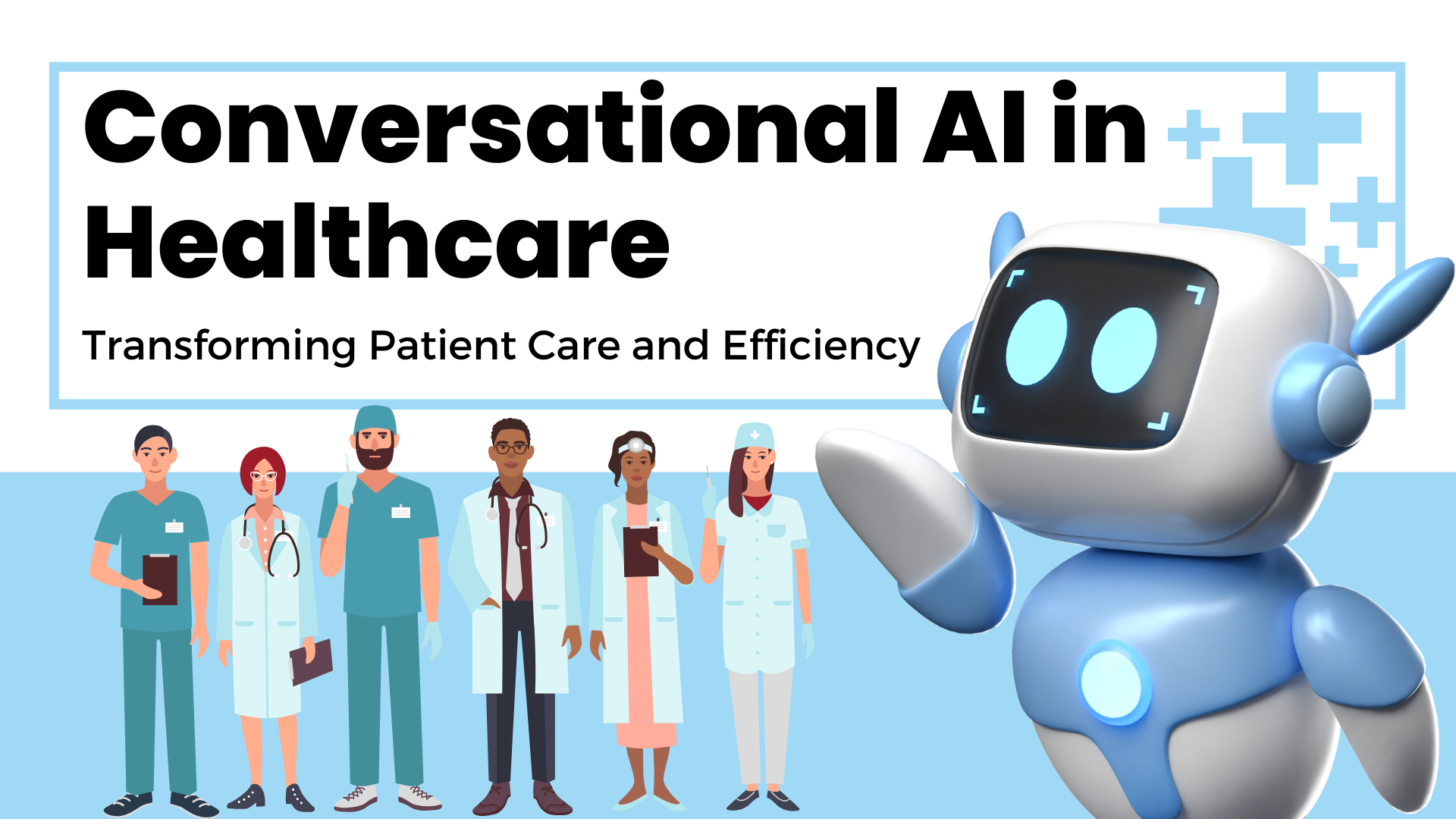Introduction
Healthcare industry is under pressure to deliver high-quality care while maintaining costs and improving patient outcomes. Traditional systems are often inefficient, have long wait times and lack accessibility, even though they’re effective. Artificial intelligence can be helpful. Conversational AI in Healthcare helps healthcare professionals improve quality and efficiency by using advanced NLP and machine learning.
Healthcare providers can interact more effectively with their patients using conversational AI, whether it’s for appointment setting and symptom check-ups or health advice. How does conversational AI transform healthcare? How will this affect both patients and providers? We’ll dive deeper into specifics.

Healthcare Efficiency Crisis
The healthcare system has been plagued by inefficiency, overwork and costs for a long time. Administrative burdens on nurses and doctors leave them with less time to care for patients. Patients often face long waiting times for healthcare and have difficulty accessing services in rural areas or other underserved regions.
A question or schedule an appointment for a client can take days or even several weeks. A report by the American Medical Association shows that physicians can spend as much as 50% of their day on administrative work. Burnout is a result, and patients have a fragmented healthcare experience.
Patients also feel this inefficiency. Accenture found that 80% of the patients were frustrated with healthcare systems due to their lack of accessibility and communication. Healthcare providers must find ways to reduce inefficiencies and improve the engagement of patients without compromising quality.
Conversational AI: The solution to the problem.
This AI can help to solve many of these problems. Conversational AI, whether it comes in the form of chatbots or virtual assistants, as well as voice-based systems, helps to streamline communication and reduce administrative burdens.
Conversational AI has already transformed healthcare through the use of tools like Siri or Google Assistant. They allow users to schedule appointments or ask medical questions without having to wait on hold.
How conversational AI can improve patient care
Access 24/7 to Healthcare Support
Patients are often in a hurry to get answers, be it about their symptoms or a prescribed medication. The traditional methods, such as scheduling an appointment or calling the clinic, can take a long time. This leaves patients feeling anxious and without vital information. This is solved by Conversational AI, which provides 24/7 access to the healthcare system.
AI-powered virtual assistants can answer medical questions at any hour of the day. Studies show that AI chatbots such as Buoy Health or Ada Health can already provide accurate symptoms checking by analyzing user input. The immediate accessibility helps patients to feel understood and decreases the number of unnecessary healthcare visits.

Streamlining Administrative Tasks
The majority of the time that healthcare professionals spend on administrative tasks, such as scheduling, checking insurance, and processing records, is spent doing these. Automating these tasks using an AI-powered system .
AI chatbots that are integrated with practice management software will handle communication and appointment reminders. The workload of employees is reduced. Mayo Clinic’s chatbot, for instance, provides answers to common questions regarding the hours of operations, the services offered, and the scheduling of appointments. The process is more efficient, and both patients and administrators benefit from it.
Enhancing accessibility and reducing wait times
Patients often complain about long wait times. According to a report by the American Hospital Association, patients spend more time waiting in the hospital than they ever have before. This can cause frustration and unhappiness. Conversational AI could play an important role in decreasing these waiting times.
Virtual assistants allow patients to quickly reach the appropriate healthcare provider without having to wait on hold. AI systems are able to triage questions from patients, sending urgent issues directly to doctors or nurses while automatically resolving simple inquiries. The patient’s experience is improved by the reduction of waiting time.
Improving Health Literacy and Education
Information is one of the biggest obstacles to good health. Patients often don’t understand the full extent of their conditions and treatment options. This gap can be bridged by conversational AI, which provides personalized and easy-to-understand explanations that are based on the patient’s data.
Platforms like HealthTap and Mediktor, for example, allow users to submit medical questions to receive tailored responses based on their symptoms and past medical histories.

Supporting Mental Health Care
The mental health industry is also a sector where conversational AI plays a significant role. AI-powered apps for mental health, like Wysa or Woebot provide users with mental support via conversations. AI is used to provide cognitive behavioral therapy techniques (CBT), mindfulness exercises, and mood tracking.
It is an important step in a sector where the availability of care is limited. According to the World Health Organization, there is an acute shortage of mental healthcare professionals in many countries, particularly those with low and medium incomes. AI-powered apps for mental health can help fill the gap by providing immediate support while reducing the stigma around mental health care.
Improve data accuracy and patient outcomes.
AI also helps improve accuracy in diagnosis and treatment. AI is able to identify patterns in large amounts of medical data that human doctors may have missed. It allows doctors make better decisions and improves patient outcomes.
IBM Watson Health, for example, is being used to analyze cancer patient medical records in order to recommend personalized treatments based on current research. Watson and other AI systems help doctors to make more evidence-based treatment decisions.
Conversational AI is a technology that will have a significant impact on the way we provide healthcare. Its potential benefits, such as reduced administrative costs and improved patient accessibility, are too important to overlook. This technology is already helping patients get faster responses and personalized care.
I’ve found that AI-driven systems can also help reduce burnout in healthcare professionals. Because doctors and nurses are so busy with routine tasks, it is difficult to provide the care patients deserve. AI automates some of these routine tasks to free up medical professionals’ time so they can focus on the things that really matter–treating patients.

Conclusion
It has the potential to transform healthcare. It is more than a trend. Conversational AI makes healthcare accessible and more effective by improving efficiency and decreasing costs.
Conversational AI has many benefits despite the challenges. We can expect more AI applications in healthcare as technology advances.
The integration of AI in healthcare is a natural progression. The sooner we accept it, the faster we will be able to see its true potential for a patient-centered, more efficient healthcare system.
FAQs
Conversational AI is a new technology in the healthcare industry.
In healthcare, conversational AI refers in order to improve communication between healthcare professionals and patients. These systems automate repetitive tasks such as scheduling appointments and answering questions from patients.
Conversational AI: How can it improve patient care
The use of conversational AI improves the patient experience by providing 24/7 access to information about health, streamlining administrative processes, reducing waiting times, and streamlining administrative duties. Conversational AI offers immediate answers to health questions, and it can also direct patients to the right healthcare professionals based on what they need. It improves patient satisfaction and allows providers to concentrate more on the actual treatment.
Can conversational AI help reduce healthcare costs?
Conversational AI is a great way to reduce costs in healthcare by automating tasks such as scheduling appointments, verifying insurance, and communicating with patients. It reduces the workload for healthcare workers, minimizes human errors, and makes better use of available resources.
How can conversational AI be used in the healthcare industry?
Some of the most well-known examples are:
- Buoy Health is an AI-powered bot that assists users in symptom check.
- Babylon Health: A platform that combines AI and human doctors for virtual consultations.
- HealthTap is an AI-driven health app that offers personalized advice and virtual doctor consultations.
- Woebot is a mental health bot that helps users to manage anxiety and depression using cognitive behavioral therapy.
Conversational AI: How can it improve the administrative efficiency of healthcare?
Conversational AI automates time-consuming administrative duties such as scheduling patients, verifying insurance, and reminding them to follow up. The automation of administrative tasks reduces burdens on the healthcare staff and increases workflow efficiency. AI chatbots can, for example, manage appointments of patients without human involvement, saving both time and errors.
AI bots can provide medical advice?
These AI chatbots are useful for providing guidance, such as checking symptoms and giving general health advice, but they do not replace the role of healthcare professionals. These chatbots can provide basic health information or refer patients to a healthcare professional. A chatbot can help you triage your symptoms and determine if a doctor’s visit is needed. However, it cannot give a diagnosis.
Conversational AI can reduce the wait time for patients?
It reduces the amount of time that patients wait for answers by automating patient questions and follow-ups, and other similar activities. Virtual assistants connect patients to healthcare professionals quickly or guide them to self-help materials, reducing red measuring the length of time for health care services.
What is the safety of patient information and data when using conversational AI?
Security is paramount in healthcare. This is especially true for patient data. Conversational AI platforms must comply with regulations like HIPAA that ensure data privacy and security for patients in the U.S.
To protect sensitive information from unauthorized access, reputable AI platforms employ encryption and other measures of security.
What is the role of conversational AI in mental health?
Conversational AI is a powerful tool for supporting mental well-being by giving users immediate access to resources. AI-driven platforms like Woebot or Wysa offer a variety of mental health resources, including cognitive behavioral therapy techniques (CBT), mood tracking, and coping skills. The tools are designed to make mental support easier, particularly in places where there is a lack of qualified mental health professionals.
How will conversational AI affect healthcare in the future?
Conversational AI’s future in healthcare looks promising. As AI technology improves, including personalized treatment plans and better diagnostic tools. This technology is also likely to play an important role in improving patient engagement and the overall efficiency of healthcare systems.

